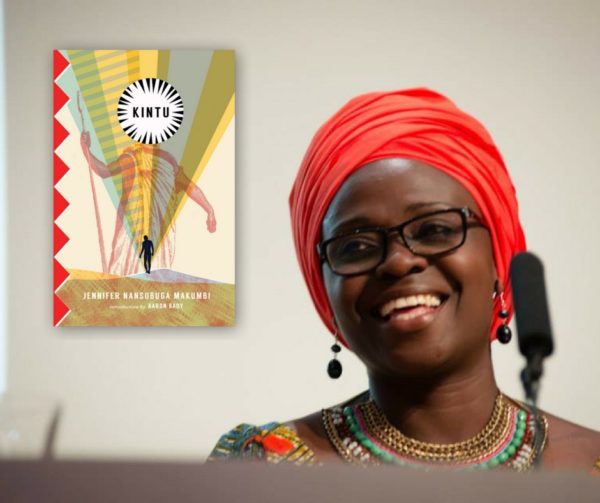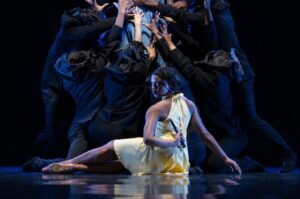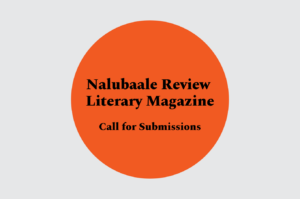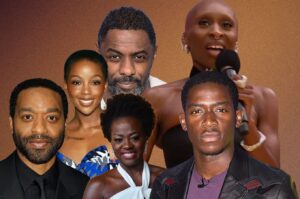
Uganda’s Jennifer Nansubuga Makumbi, author of Kintu, has been awarded a $165,000 Windham-Campbell Prize. She is being honoured alongside: poets Lorna Goodison (Jamaica) and Cathy Park Hong (US); dramatists Lucas Hnath (US) and Suzan-Lori Parks (US); nonfiction writers Sarah Bakewell (UK) and Olivia Laing (UK); and fellow fiction writer John Keene (US). Makumbi is now the seventh African writer so honoured, following wins by: South Africans Zoe Wicomb, in fiction, and Johnny Steinberg, in nonfiction, in 2013; Sierra Leonean-Scottish Aminatta Forna, in fiction, in 2014; and Nigerians Teju Cole and Helon Habila and South African Ivan Vladislavic, all in fiction, in 2015.
Established in 2013 “with a gift from the late Donald Windham in memory of his partner of 40 years, Sandy M. Campbell,” and administered by the Beinecke Rare Book and Manuscript Library at Yale University, the $165,000 Windham-Campbell Prizes recognizes writers in the fields of fiction, poetry, drama and nonfiction as a way “to support their writing.” It is one of the richest literary prizes in the world.
In an email to Brittle Paper, the Prize Director Michael Kelleher, who we interviewed last year, stated that only writers working in the English language are eligible and “are nominated confidentially and judged anonymously. The call that Prize recipients receive from [the] program director is the first time that they have learned of their consideration.”
“The day I make the call to notify award winners is the highlight of the year, as each cycle I hear how much of a difference it will make for them. Six years on, we can now to see the impact the prizes have on these writers’ lives, careers, and their work. The feeling is magical.”
In her citation, Makumbi was chosen for how she, in her novel Kintu, “opens up a bold and innovatory vista in African letters, encompassing ancient wounds that disquiet the present, and offering the restitution to be found in memory and ritual.”
Resident in Manchester, England, Jennifer Makumbi’s Kintu—then titled The Kintu Saga—won the Kwani? Manuscript Project Award in 2013. In 2014, Kintu was published in Kenya by Kwani Trust, was longlisted for the then Etisalat Prize, and Makumbi herself received the Commonwealth Short Story Prize for her “Let’s Tell This Story Properly.” In 2017, Kintu was published in the US by Transit Books, and in the UK and the Commonwealth by Oneworld Publications—publishers of Marlon James’ A Brief History of Seven Killings and Paul Beatty’s The Sellout, the respective winners of the Booker Prize in 2015 and 2016. Makumbi has a PhD in African Literature from Lancaster University, and has taught creative writing at colleges and universities around the United Kingdom. Her collection of short stories, Love Made in Manchester, is forthcoming from Transit Books in January 2019.
The Windham-Campbell Prize notes that:
Kintu tells the parallel stories of the fall of a cursed bloodline—the titular Kintu clan—and the rise of modern Uganda. With an extraordinarily ambitious and agile narrative voice that blends traditional oral storytelling with folk tales, mythology, and biblical elements, Makumbi delivers an incisive critique of contemporary Ugandan class, politics, and religion. Critic Aaron Bady has said that Kintu is a novel about how “all families are built out of silences and fictions.” Kintu traces the lineages of these lacunae, in the process charting new possibilities for the future of the African novel.
Here are the citations of the other recipients:
DRAMA
Lucas Hnath’s agile writing ranges across genres and subjects with voracious curiosity; his wit, formal daring and poetic precision crystallize dramas that are socially incisive and indelible.
Suzan-Lori Parks is an artist whose ethical imagination confronts rather than consoles; she acknowledges in the fissures of language and human relations the complexities of a fraught world.
FICTION
With coruscating imagination, language and thought, John Keene experiments with concealed scenes from history and literature, stepping outside the confines of conventional narrative.
NONFICTION
Sarah Bakewell unknots complex philosophical thought with verve and wit; her eye for detail and her animated conversation bring readers to inhabit the lives of great philosophers.
Olivia Laing is a cartographer of human emotion, mixing memoir, biography and critical engagement with an acute sense of place; through the arts, she searches the depths of the self.
POETRY
Lorna Goodison’s poetry draws us into a panoramic history of a woman’s life, bearing witness to female embodiment, the colonial legacy, mortality, and the sacred.
Cathy Park Hong’s exhilarating and surprising language connects us to unheard migrant voices, and her searching look at dystopic states gives her poetry urgent power.
The 2018 Windham-Campbell Awards will be conferred September 12-14 at an international literary festival at Yale.
Considering how the Windham-Campbell Prize leans towards writers with an established body of work or who have been prominently placed over time—previous winners Aminatta Forna, Teju Cole, Helon Habila, and Ivan Vladislavic, for instance, and 2018 winners Suzan-Lori Parks, Lorna Goodison, and Olivia Lang—this is a major feat for Makumbi who has one published book of fiction, but one which has anchored some of the most important conversations on our literary scene. It is a recognition of the immense achievement that is Kintu.
Congratulations to Jennifer Makumbi.









COMMENTS -
Reader Interactions